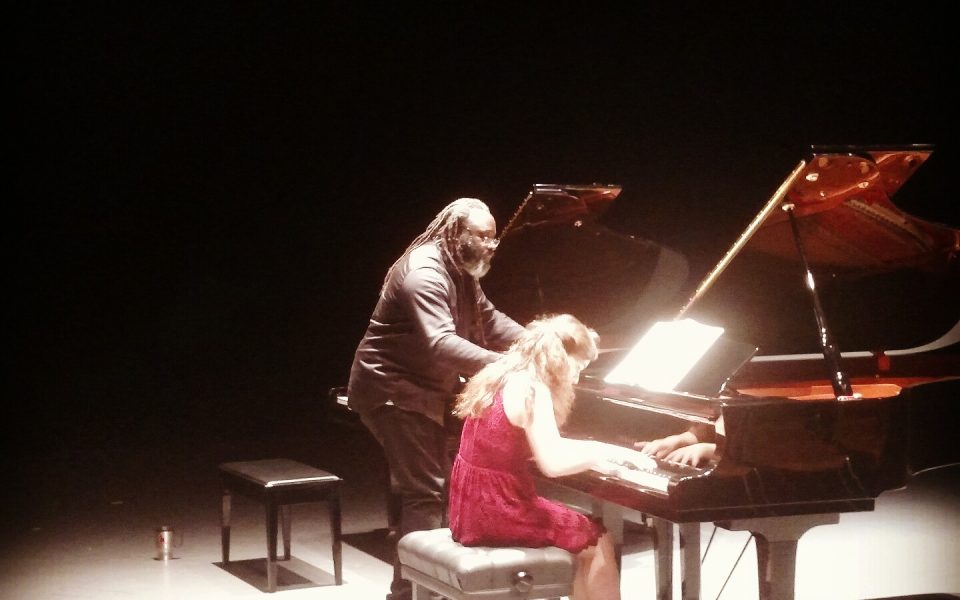Black drapes hung from the ceiling, surrounding the floor-level stage. The house lights shining over the small seating area of Sternberger Auditorium dimmed and, of the darkness, the two grand pianos materialized beneath the stage lights. Sitting side by side in the middle of the stage, the instruments were held in a solemn aureole, artifacts in a temple.
Illuminated and holy, the wood seemed alive in the glow. The first student came to the stage, bowed, sat at the bench, and a silence filled the room like a calmed tide before a swelling storm. A silence, a breath, a sound. And as fingers aligned on the bone-white keys, the silence became music.
The master class on July 6 was one of several held throughout the month-long Eastern Music Festival. The festival comprises dozens of acclaimed faculty members from around the country, bringing them together for such master classes, recitals and orchestral performances, all of which are available to the public.
As the first student of famed pianist and composer Awadagin Pratt’s master class played Beethoven’s Piano Concerto No. 5 in E-flat major, Pratt sat off to the side in the darkness, watching, listening, as if merely another face in the small crowd. Pratt glanced every so often at the concerto’s score which lay open in his lap, and then closed his eyes, listening intensely to the performance. As the student, Madison Blake, finished and took a bow, Pratt walked onto stage and the lesson began. Seemingly oblivious to the audience, Pratt jumped right into the piece with Blake. Beginning with a notoriously difficult section, he sat down at the second piano, and began a call and response type of lesson. Directing his voice and attention solely to the student, Pratt gave the history of the piece, expounded on the subtle notes and led Blake through each troubling spot — which went unheard by the audience, but Pratt’s expert ear picked up from one performance.[pullquote]The Eastern Music Festival runs until July 29. For more information on tickets and concert schedules visit easternmusicfestival.org.[/pullquote]
Getting an early start on his career, Pratt entered the University of Illinois when he was 16, studying piano, violin and conducting. He later enrolled at the Peabody Conservatory of Music and became the first student in the school’s history to receive diplomas in three performance areas — piano, violin and conducting. Pratt has performed with countless orchestras and won numerous awards for his achievements; among them the Naumburg International Piano Competition; two years later he was awarded an Avery Fisher Career Grant. Recently, Pratt was named one of the 50 Leaders of Tomorrow in Ebony magazine’s 50th anniversary issue. For the Eastern Music Festival, hosting faculty of such prominence remains a standard for each passing year since its inception in 1961. And though Pratt’s career achievements alone are enough to astound any music fan, seeing such a master at work was something else entirely.
The second student of the recital performed Balakirev’s Islamey, op.18. Arguably one of the single most difficult compositions to play on piano, the student, Tabea Klees, earned a respectful applause for her performance. And, similar to all of the students, Pratt took the remarkable work by the student and strove to make it even better with the half-hour lesson he had to work with. Wasting no time, Pratt moved directly to the first measures of the piece, which opens with fast and meticulous fingering, difficult for even the greatest of pianists to perform without flaw. But while the piece is famous for its difficult nature, Pratt calmly dove into the lesson measure by measure, taking special time to speak about the accents and dynamics which make the piece what it is.
“Without all of Balakirev’s notes and directions, the piece fails,” Pratt said to the student. “You have to take the time to study each accent, each pause between notes, in order to bring it to life.”
Pratt demonstrated extensive knowledge of each piece; from merely hearing the student’s performance once, his recall of precisely the way in which the student played was perfect and seemed effortless, as if he had studied their performances for years.
The master class ended with performer Kevin Takeda playing Rachmaninov’s Piano Concerto No.3 in D minor. Pratt took special interest on this piece from a composer’s point of view. He walked through the concerto’s dynamics with the students, reminding them of the importance of context within the entire orchestra.
Pratt’s teaching was full of seemingly simple notes for the students but are merely the tip of a vast iceberg in which lies an entire history of classical music. Patience and nearly spiritual reverence for every note, every measure marked Pratt’s vast knowledge and expertise when it comes to the piano performance. A silence, a breath, a sound. And suddenly a piece of music comes to life.
Join the First Amendment Society, a membership that goes directly to funding TCB‘s newsroom.
We believe that reporting can save the world.
The TCB First Amendment Society recognizes the vital role of a free, unfettered press with a bundling of local experiences designed to build community, and unique engagements with our newsroom that will help you understand, and shape, local journalism’s critical role in uplifting the people in our cities.
All revenue goes directly into the newsroom as reporters’ salaries and freelance commissions.


Leave a Reply